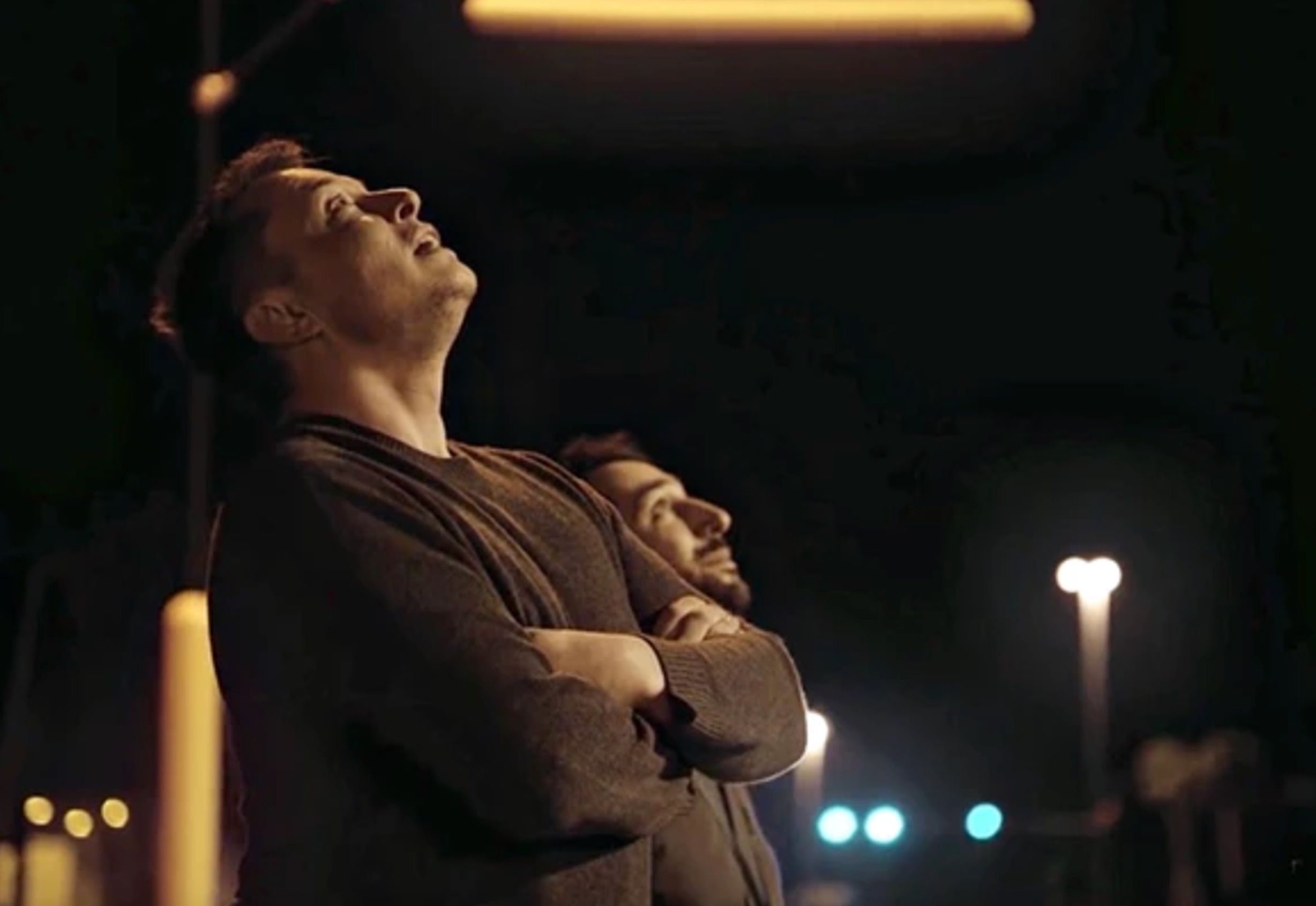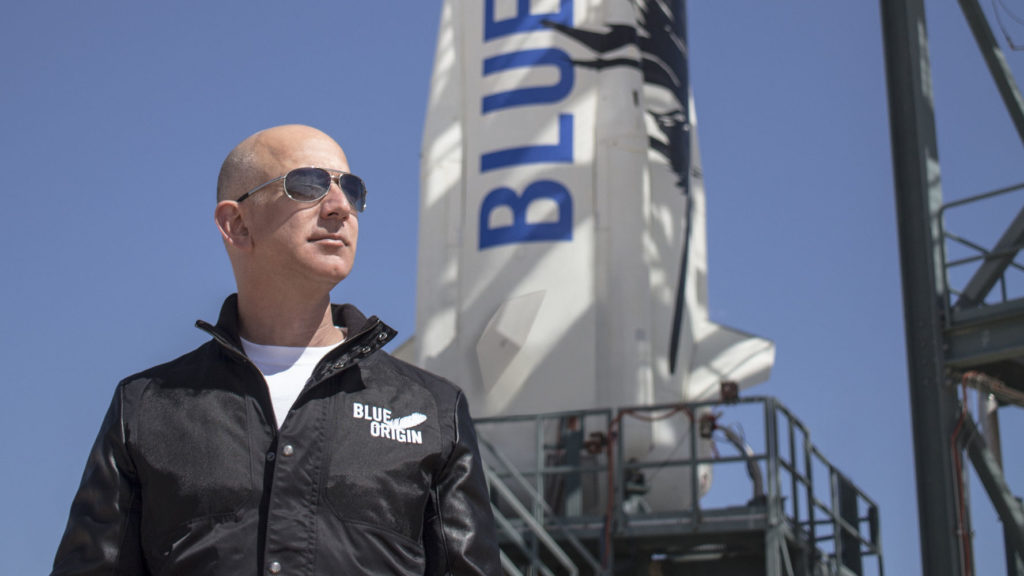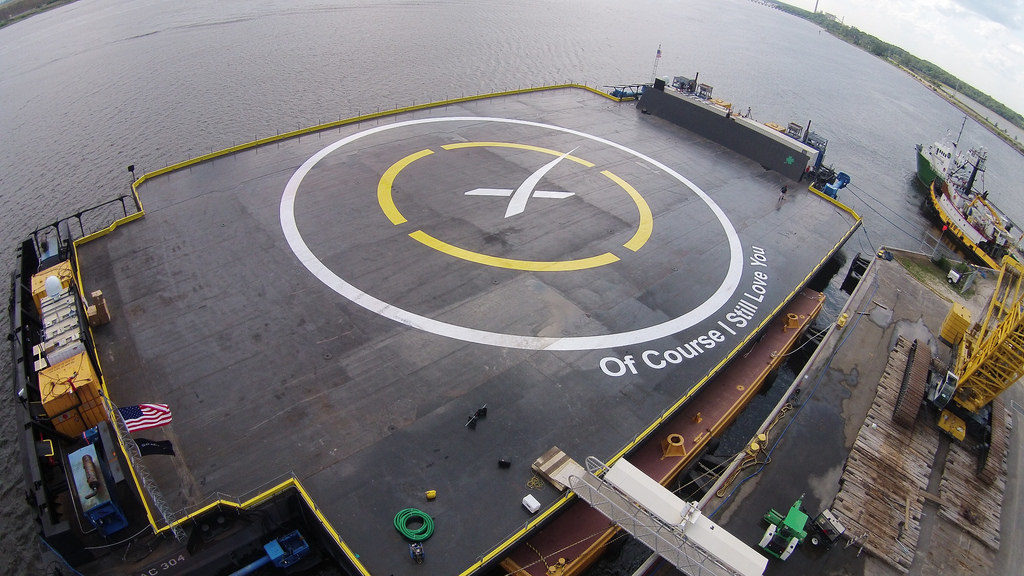

News
Does Elon Musk hold the moral high ground in the commercial space race? Jeff Bezos might disagree.
In the minds of technology-aware people around the globe, Elon Musk holds unique positions in the world of commercial spaceflight:
- Launching and landing rockets.
- Launching and landing reused rockets.
- Launching and landing private rockets funded by the paying customers of a spaceflight company founded with totally private capital.
None of that is to be taken lightly, especially considering Musk’s stated goal of colonizing Mars (and beyond?). All of that combined with the fact that SpaceX’s closest competitors are either centered on rich tourists (Virgin Galactic, Blue Origin) or almost entirely government (contract) funded (Boeing, ULA), and Elon Musk looks to have a type of moral “high ground” over other industry players with a humanity-first approach.
That might not be an entirely fair assessment, though. It’s helpful to first have the full(er) history of commercial spaceflight on hand, and second to have the long-term goals of other players in mind in order to consider where SpaceX really fits in.
A SHORT HISTORY OF COMMERCIAL SPACEFLIGHT
The commercial space industry started shortly after the first satellite was launched in 1957 when the privately-owned Telstar I satellite was put into orbit using a commercially-sponsored rocket in 1962. Congress provided the regulatory framework for such missions shortly after, and hundreds of private satellites were launched in the years following. SpaceX’s earliest predecessor, Space Services, Inc. of America (SSIA), was the first to put a privately owned and operated rocket into space, albeit not into orbit.
- Fun Fact: SSIA is now a star-naming company which has previously contracted cargo space with SpaceX.
After the government provided a better regulatory environment for commercial spaceflight in 1984, SSIA also became the first private company to acquire and use a launch license. In case you’re curious, the rocket didn’t make it to space.
Who was the first private company to make it to orbit on a privately developed rocket, then? That honor would go to Orbital Sciences Corporation (now Orbital ATK, another SpaceX contractor) in 1990, although the rocket was air launched from an airplane. That achievement was followed up by Scaled Composites’ SpaceShipOne in 2004, another air launched vehicle, although it was a rocket-powered aircraft rather than just a rocket. It still holds the title as the first and only privately-funded manned craft to reach space. Virgin Galactic has taken over its successor, SpaceShipTwo, which is still under development with the primary goal of shuttling rich tourists on suborbital thrill rides.
- Fun Fact: United Launch Alliance (ULA), SpaceX’s only bidding competitor for Air Force contracts, was actually formed only to serve government rocket launch needs after legislation was passed requiring NASA to use private spaceflight companies for non-Space Shuttle essential missions. Boeing and Lockheed Martin, traditional government space and defense contractors, came together to form the ULA venture to serve this need, and the rest is mostly guaranteed-NASA-contract-friendly history. Boeing and Lockheed Martin are also the primary contractors developing NASA’s new Space Launch System and Orion crew capsule. For these reasons, I don’t really consider ULA to be a true part of the “new space race”.
SpaceX entered the history records in 2008 when Falcon 1 reached orbit as the first privately developed liquid fueled rocket. Their record list entries have grown ever since:
- 2010, the Dragon capsule was successfully launched into orbit and recovered, making it the first private capsule to do so.
- 2012, the Dragon capsule made a successful trip to the International Space Station (ISS) as the first private spacecraft to do so.
- 2015, Falcon 9 successfully landed after returning from orbit, the first orbital rocket to do so.
- 2017, a reused Falcon 9 core was successfully launched and landed after returning from orbit, making it the first privately owned rocket to do so.
Right before SpaceX’s 2015 landing, Amazon founder Jeff Bezos finally revealed what his secretive space company, Blue Origin, had been up to. Beating SpaceX’s landing by a month, Bezos revealed footage of Blue Origins’ tourist-industry rocket, New Shepard, successfully launching into space and landing itself. The differences between the two companies’ landing achievements are notable; however, Blue Origin still walked away with first prize.
Even so, in commercial spaceflight history, SpaceX’s reputation as an innovator driving the privatization of the space industry is well deserved. But does Elon Musk get to claim a moral “high ground” given SpaceX’s autonomous origins and humanity-centric goals?
JEFF BEZOS IS A DREAMER, TOO
Blue Origin might call that designation into question. How so, especially when Blue Origin’s rocket is a tourist attraction (with no restroom or regurgitation facilities I might add)?
Well, first of all, according to Bezos it doesn’t have to just be a tourist vehicle. In a recent talk given at the 33rd annual Space Symposium, Bezos suggested that the New Shepard could be used as the first stage of another multi-stage rocket rather than just the single stage for his “Astronaut Experience” tourist adventure. That could (potentially) put New Shepard in line with Falcon 9’s customer base.
Most importantly, though, New Shepard is just the beginning of Blue Origin’s long-term goals for space travel. The engine (BE-4) for their expandable heavy launch vehicle, New Glenn, is under development and will be a prime competitor with SpaceX’s Falcon Heavy once in operation.
Back to the “high ground” question, the founder of Amazon had dreams of being a space entrepreneur way before that concept truly existed, and Bezos went into computer science knowing he needed plenty of money to reach that goal. Musk didn’t consider space technology exclusively, but rather went in as a way to be part of pushing humanity’s development forward. Purity of intent? Points for both.
Bezos himself has acknowledged that there are similarities in the goals of both SpaceX and Blue Origin, citing the two companies’ pursuit of vertical landings and quick reusability as the primary ones. For a time, SpaceX was unique in the “new space” arena by not using space tourism as a funding mechanism, but now that they’ve announced their contract to take some very rich customers on a trip around the Moon, they’ve lost that designation. What’s more, Blue Origin has also announced their own Moon program, but it will be to assist with cargo needs for development of a permanent Moon base.
Plus one for Blue Origin.
Both SpaceX and Blue Origin were founded with private funds, and the funding for their developments to date come from a mix of both government and private sources. Technically, Blue Origin is almost entirely privately funded, but they received two rounds of funding from NASA as part of their Commercial Crew Development program that can’t be ignored. Also, their contract with ULA to develop the BE-4 engine (to be used on both Blue Origin’s New Glenn rocket series and ULA’s upcoming Vulcan rocket) makes the designation murky. ULA only launches rockets for government cargo, so whether the money Blue Origin receives from them is truly “private” is a matter of money-trail opinion. On a further note, Bezos has pledged to invest an annual billion dollars of his own funds into Blue Origin.
Plus one for Blue Origin, but plus two for SpaceX for already running a viable, profitable space launch company with plenty of private customers.
What about Mars? Well, Elon Musk has made it no secret that Mars is the primary goal of SpaceX’s technology achievements, and he really, really wants to settle humans there to save the species from potential future disaster. Bezos, on the other hand, has likened the purpose of going to Mars as “because it’s cool”. However, Bezos also wants to do all the “heavy lifting” in building the infrastructure necessary for space commercialization to take off. He used the existing Internet and shipping systems to build Amazon, so now he wants to build the Internet and shipping system equivalents in space with Blue Origin’s technology.
Plus one for both, and I think that means the two are even.
MORAL HIGH GROUND?
The answer to the question of moral standing is then, of course, entirely based on one’s opinion of the future of human spaceflight and the roles we should pursue outside of our home planet. Also as an honorable mention for consideration is one’s economic persuasion in the form of a “chicken or the egg” scenario.
Government has taken us to space and enabled a booming satellite communications market, but we haven’t even returned to the Moon since 1972. Would a privatized space industry have us on Mars already? We can further consider that NASA gave us memory foam, Tang, and underwater pens; however, would better, cheaper versions been developed on their own in the commercial sector as the need for such products for Earth-based activities developed independent of government projects?
Once again returning to the question of a greater-purpose-driven space program, does space tourism lead to trickle-down space exploration, i.e., eventual space travel for the average citizen? Or will it take an “infrastructure first” approach to really make that sort of space travel be a reality?
If a space company claims that its long-term goal is to benefit the future of human kind, the use of space tourism certainly looks to be economically justified as a funding mechanism. But does that then mean that the future of humanity in space is being bred on the “bread” (sorry) of the super-rich?
While it wouldn’t be the first time an industry grew in such a way, there exists a population of folks that prefer a little more “purity” in their spaceflight. Yours truly happens to be such a crab, but I also acknowledge that such sentiments come from growing up only knowing space as taught by a science-centric NASA. Space has always been cool because it gives us a broader perspective of our place in the universe. I never fantasized about opening the first deep space McDonald’s (or Rudy Tyler’s Burger Shack if you understand a bad Space Camp movie reference).
Elon Musk was a game changer in the commercial space world by pursuing rockets as a means of bettering humanity. That gave him a “one-up” over Jeff Bezos and Blue Origin for the purist crowd. Now that SpaceX has added millionaire Moon tourism to its manifest, however, and Blue Origin is moving along into non-tourist space developments to build infrastructure, the field is evening out. It’s also prudent to mention that there are many other rocket companies out there developing private vehicles that we’ll be hearing from eventually.
COMING UP
So what’s up next for SpaceX? The Hawthorne-based rocket company will be back to its regularly scheduled history-making programming this summer with the launch of Falcon Heavy, and later this year Crew Dragon is set to launch, making SpaceX one step closer to launching American astronauts on American soil.
First up, however, Falcon 9 will launch on April 30th, carrying NROL-76 into a secretive orbit from SpaceX’s refurbished Apollo pad, Launch Complex 39A at Kennedy Space Center in Florida. Not many other details are available about payload, though. It’s for the National Reconnaissance Office, so publicly available information is slim. We should see the first stage make a ground landing as consolation – fingers crossed the video doesn’t cut out!
We can also add this launch to the history books again for SpaceX. This is the first payload SpaceX will have ever launched for the U.S. Department of Defense, having beaten ULA for the contract after threatening to sue the Air Force for the right to bid. Watch out, traditional government launch contractors. SpaceX is moving in to your turf. When Blue Origin is ready to start the bidding war, it will be interesting to see how they work out that ULA relationship.
Stay tuned!

News
Tesla wins another award critics will absolutely despise
Tesla earned an overall score of 49 percent, up 6 percentage points from the previous year, widening its lead over second-place Ford (45 percent, up 2 points) to a commanding 4-percentage-point gap. The company also excelled in the Fossil Free & Environment category with a 50 percent score, reflecting strong progress in reducing emissions and decarbonizing operations.

Tesla just won another award that critics will absolutely despise, as it has been recognized once again as the company with the most sustainable supply chain.
Tesla has once again proven its critics wrong, securing the number one spot on the 2026 Lead the Charge Auto Supply Chain Leaderboard for the second consecutive year, Lead the Charge rankings show.
NEWS: Tesla ranked 1st on supply chain sustainability in the 2026 Lead the Charge auto/EV supply chain scorecard.
“@Tesla remains the top performing automaker of the Leaderboard for the second year running, and increased its overall score by 6 percentage points, while Ford only… pic.twitter.com/nAgGOIrGFS
— Sawyer Merritt (@SawyerMerritt) March 4, 2026
This independent ranking, produced by a coalition of environmental, human rights, and investor groups including the Sierra Club, Transport & Environment, and others, evaluates 18 major automakers on their efforts to build equitable, sustainable, and fossil-free supply chains for electric vehicles.
Tesla earned an overall score of 49 percent, up 6 percentage points from the previous year, widening its lead over second-place Ford (45 percent, up 2 points) to a commanding 4-percentage-point gap. The company also excelled in the Fossil Free & Environment category with a 50 percent score, reflecting strong progress in reducing emissions and decarbonizing operations.
Perhaps the most impressive achievement came in the batteries subsection, where Tesla posted a massive +20-point jump to reach 51 percent, becoming the first automaker ever to surpass 50 percent in this critical area.
Tesla achieved this milestone through transparency, fully disclosing Scope 3 emissions breakdowns for battery cell production and key materials like lithium, nickel, cobalt, and graphite.
The company also requires suppliers to conduct due diligence aligned with OECD guidelines on responsible sourcing, which it has mentioned in past Impact Reports.
While Tesla leads comfortably in climate and environmental performance, it scores 48 percent in human rights and responsible sourcing, slightly behind Ford’s 49 percent.
The company made notable gains in workers’ rights remedies, but has room to improve on issues like Indigenous Peoples’ rights.
Overall, the leaderboard highlights that a core group of leaders, Tesla, Ford, Volvo, Mercedes, and Volkswagen, are advancing twice as fast as their peers, proving that cleaner, more ethical EV supply chains are not just possible but already underway.
For Tesla detractors who claim EVs aren’t truly green or that the company cuts corners, this recognition from sustainability-focused NGOs delivers a powerful rebuttal.
Tesla’s vertical integration, direct supplier contracts, low-carbon material agreements (like its North American aluminum deal with emissions under 2kg CO₂e per kg), and raw materials reporting continue to set the industry standard.
As the world races toward electrification, Tesla isn’t just building cars; it’s building a more responsible future.
News
Tesla Full Self-Driving likely to expand to yet another Asian country
“We are aiming for implementation in 2026. [We are] doing everything in our power [to achieve this],” Richi Hashimoto, president of Tesla’s Japanese subsidiary, said.

Tesla Full Self-Driving is likely to expand to yet another Asian country, as one country seems primed for the suite to head to it for the first time.
The launch of Full Self-Driving in yet another country this year would be a major breakthrough for Tesla as it continues to expand the driver-assistance program across the world. Bureaucratic red tape has held up a lot of its efforts, but things are looking up in some regions.
Tesla is poised to transform Japan’s roads with Full Self-Driving (FSD) technology by 2026.
Richi Hashimoto, president of Tesla’s Japanese subsidiary, announced the ambitious timeline, building on successful employee test drives that began in 2025 and earned positive media reviews. Test drives, initially limited to the Model 3 since August 2025, expanded to the Model Y on March 5.
Once regulators approve, Over-the-Air (OTA) software updates could activate FSD across roughly 40,000 Teslas already on Japanese roads. Japan’s orderly traffic and strict safety culture make it an ideal testing ground for autonomous driving.
Hashimoto said:
“We are aiming for implementation in 2026. [We are] doing everything in our power [to achieve this].”
The push aligns with Hashimoto’s leadership, which has been credited for Tesla’s sales turnaround.
In 2025, Tesla delivered a record 10,600 vehicles in Japan — a nearly 90% jump from the prior year and the first time exceeding 10,000 units annually.
BREAKING 🇯🇵 FSD IS LIKELY LAUNCHING IN JAPAN IN 2026 🚨
Richi Hashimoto, President of Tesla’s Japanese subsidiary, stated: “We are aiming for implementation in 2026” and added that they are “doing everything in our power” to achieve this 🔥
Test drives in Japan began in August… pic.twitter.com/jkkrJLszXN
— Ming (@tslaming) March 5, 2026
The strategy shifted from online-only sales to adding 29 physical showrooms in high-traffic malls, plus staff training and attractive financing offers launched in January 2026. Tesla also plans to expand its Supercharger network to over 1,000 points by 2027, boosting accessibility.
This Japanese momentum reflects Tesla’s broader international expansion. In Europe, Giga Berlin produced more than 200,000 vehicles in 2025 despite a temporary halt, supplying over 30 markets with plans for sequential production growth in 2026 and battery cell manufacturing by 2027.
While regional EV sales faced headwinds, the factory remains a cornerstone for Model Y deliveries across the continent.
In Asia, Giga Shanghai continues to be recognized as Tesla’s powerhouse. China, the company’s largest market, saw January 2026 deliveries from the plant rise 9 percent year-over-year to 69,129 units, with affordable new models expected later this year.
FSD advancements, already progressing in the U.S. and South Korea, are slated for Europe and further Asian rollout, complementing plans to expand Cybercab and Optimus to new markets as well.
With OTA-enabled autonomy on the horizon and retail strategies paying dividends, Tesla is strengthening its footprint from Tokyo showrooms to Berlin assembly lines and Shanghai exports. As Hashimoto continues to push Tesla forward in Japan, the company’s global vision for sustainable, self-driving mobility gains traction across Europe and Asia.
News
Tesla ships out update that brings massive change to two big features
“This change only updates the name of certain features and text in your vehicle,” the company wrote in Release Notes for the update, “and does not change the way your features behave.”

Tesla has shipped out an update for its vehicles that was caused specifically by a California lawsuit that threatened the company’s ability to sell cars because of how it named its driver assistance suite.
Tesla shipped out Software Update 2026.2.9 starting last week; we received it already, and it only brings a few minor changes, mostly related to how things are referenced.
“This change only updates the name of certain features and text in your vehicle,” the company wrote in Release Notes for the update, “and does not change the way your features behave.”
The following changes came to Tesla vehicles in the update:
- Navigate on Autopilot has now been renamed to Navigate on Autosteer
- FSD Computer has been renamed to AI Computer
Tesla faced a 30-day sales suspension in California after the state’s Department of Motor Vehicles stated the company had to come into compliance regarding the marketing of its automated driving features.
The agency confirmed on February 18 that it had taken a “corrective action” to resolve the issue. That corrective action was renaming certain parts of its ADAS.
Tesla discontinued its standalone Autopilot offering in January and ramped up the marketing of Full Self-Driving Supervised. Tesla had said on X that the issue with naming “was a ‘consumer protection’ order about the use of the term ‘Autopilot’ in a case where not one single customer came forward to say there’s a problem.”
This was a “consumer protection” order about the use of the term “Autopilot” in a case where not one single customer came forward to say there’s a problem.
Sales in California will continue uninterrupted.
— Tesla North America (@tesla_na) December 17, 2025
It is now compliant with the wishes of the California DMV, and we’re all dealing with it now.
This was the first primary dispute over the terminology of Full Self-Driving, but it has undergone some scrutiny at the federal level, as some government officials have claimed the suite has “deceptive” names. Previous Transportation Secretary Pete Buttigieg was one of those federal-level employees who had an issue with the names “Autopilot” and “Full Self-Driving.”
Tesla sued the California DMV over the ruling last week.










